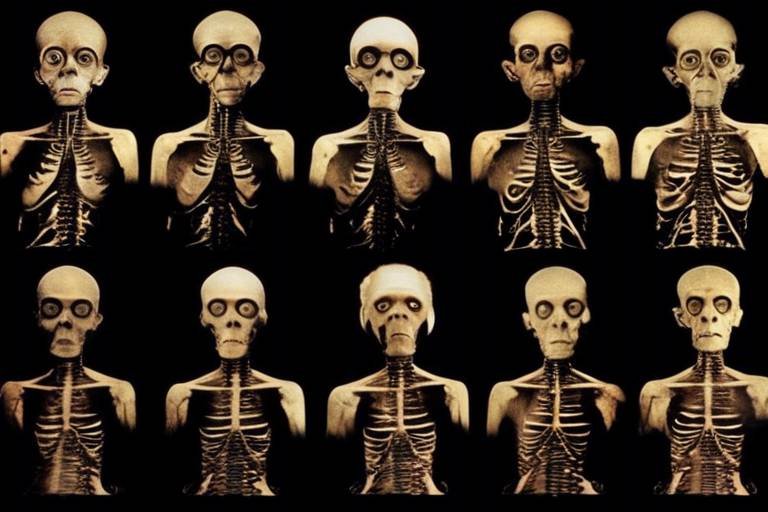Arguments Against the Universality of Consciousness
The concept of universal consciousness is one that has intrigued philosophers, scientists, and thinkers for centuries. But what if this idea is more of a comforting illusion than a reality? As we dive into the depths of consciousness, we discover a myriad of perspectives that challenge the notion that consciousness is a shared experience across all beings. By examining philosophical arguments, scientific evidence, and cultural interpretations, we can start to unravel the complexities surrounding this profound topic. So, let’s embark on this journey together and explore why many argue against the universality of consciousness.
Philosophers have long debated the nature of consciousness, and it’s fascinating to see how their arguments shape our understanding of this elusive phenomenon. Some philosophers argue that consciousness is inherently subjective, meaning that it’s deeply personal and varies from one individual to another. This subjectivity challenges the idea that consciousness can be universally defined or experienced. Imagine trying to describe a beautiful painting to someone who has never seen it; no matter how eloquently you speak, they will never fully grasp its essence without experiencing it themselves. This highlights a key philosophical argument: consciousness may be an intimate experience that cannot be generalized.
As we turn to the realm of science, we find that research continues to unveil the complexities of consciousness, suggesting it may not be a universal trait. Scientific studies have shown that different species exhibit varying levels of consciousness, which raises intriguing questions about what it means to be conscious. For instance, research in neurology reveals significant differences in brain structure and function across species, leading us to ponder: if consciousness were universal, wouldn’t we expect to see more similarities in how different beings experience it?
Neurological studies provide compelling evidence that consciousness is not a one-size-fits-all experience. For example, the human brain is wired differently than that of a dolphin or a crow. These differences can profoundly impact how species perceive their environment and respond to stimuli. Consider the following table that illustrates some of these neurological variations:
| Species | Brain Structure | Consciousness Indicators |
|---|---|---|
| Humans | Highly developed neocortex | Complex problem-solving, self-awareness |
| Dolphins | Large brain-to-body ratio | Social interaction, advanced communication |
| Crows | Asymmetrical brain hemispheres | Tool use, planning for the future |
Moreover, certain species exhibit unique cognitive abilities that suggest consciousness is tailored to specific environmental and evolutionary needs. For instance, octopuses demonstrate remarkable problem-solving skills, indicating a form of consciousness that is distinct from that of mammals. This species-specific consciousness challenges the idea that all beings share a common conscious experience. It’s like comparing a smartphone to a vintage flip phone; both are devices, but they serve different purposes and operate in fundamentally different ways.
The examination of consciousness in non-human animals provides fascinating insights into the diversity of conscious experiences. Studies on animal cognition reveal that many species possess a level of awareness and intelligence that rivals that of humans. Research on elephants, for example, shows their ability to empathize and mourn their dead, suggesting a rich inner life. This diversity in consciousness among animals raises serious challenges to the notion of a universal consciousness, as it points to a spectrum of experiences rather than a singular, shared state.
One of the most compelling arguments against the universality of consciousness is its subjective nature. Each individual experiences consciousness differently, shaped by personal and cultural contexts. Think about how two people can witness the same event yet come away with entirely different interpretations. This subjectivity suggests that consciousness is not a uniform experience but rather a unique tapestry woven from our individual perceptions and backgrounds. As we navigate through life, our experiences, beliefs, and emotions color our understanding of consciousness, making it a deeply personal journey.
Cultural beliefs and practices significantly influence how we perceive consciousness, further complicating the idea of a singular, universal experience. Different cultures conceptualize consciousness in varied ways, reflecting their values, traditions, and worldviews. For instance, many Indigenous cultures emphasize a profound interconnectedness with nature, viewing consciousness as not just an individual trait but a collective experience shared among all living beings.
When we compare Eastern and Western philosophies, we find contrasting views on consciousness that impact how individuals understand their own experiences. Western thought often leans toward an individualistic perspective, focusing on personal achievement and self-awareness. In contrast, Eastern philosophies, such as Buddhism, emphasize the interconnectedness of all life and the idea of collective consciousness. This divergence in understanding reinforces the notion that consciousness cannot be universally defined; it is shaped by cultural lenses through which we view the world.
Indigenous cultures often have unique interpretations of consciousness that challenge the universality argument. Many Indigenous beliefs center around the idea that all beings—humans, animals, plants—possess a form of consciousness that connects them to the Earth and each other. This perspective fosters a sense of responsibility toward the environment and emphasizes the importance of community and relationships. By embracing these diverse interpretations, we can better appreciate the rich tapestry of consciousness and recognize that it may not be a universal phenomenon but rather a deeply nuanced experience.
- What is universal consciousness? Universal consciousness is the idea that all beings share a common conscious experience.
- Why do some argue against universal consciousness? Many argue against it due to subjective experiences, neurological differences, and cultural interpretations that suggest consciousness varies widely among individuals and species.
- How do cultural perspectives influence consciousness? Cultural beliefs shape how individuals understand and interpret consciousness, leading to diverse views on its nature.

Philosophical Perspectives
Philosophers have long grappled with the intricacies of consciousness, often finding themselves at a crossroads between subjective experience and universal claims. The debate is rich, colorful, and at times, downright perplexing. Imagine trying to fit a round peg into a square hole; that’s what it feels like when we attempt to apply a universal lens to something as deeply personal and varied as consciousness. Some philosophers argue that consciousness is inherently subjective, shaped by individual experiences, cultural contexts, and biological differences. This perspective raises a fundamental question: if consciousness is so uniquely personal, can it truly be universal?
To illustrate this point, let’s consider the works of prominent philosophers such as René Descartes and David Hume. Descartes famously posited, "Cogito, ergo sum" (I think, therefore I am), suggesting that the act of thinking is a definitive proof of one’s existence. However, this assertion is grounded in individual experience—what about those who cannot articulate their thoughts or have different cognitive frameworks? Hume, on the other hand, emphasized the role of perception in shaping our understanding of reality. He argued that our consciousness is a tapestry woven from sensory experiences, which varies dramatically from one person to another. This leads us to ponder: if each person’s consciousness is a unique composition of experiences, how can we claim a universal consciousness exists?
Moreover, the philosophical discourse around consciousness often intersects with the concept of the "hard problem of consciousness," introduced by philosopher David Chalmers. This problem highlights the difficulty of explaining why and how subjective experiences arise from physical processes in the brain. It challenges the notion that consciousness can be universally defined or understood. If we cannot even agree on why consciousness exists, how can we assert that it is a shared experience among all beings? This dilemma prompts us to question the very fabric of our understanding of consciousness.
In addition to these philosophical debates, we must also consider the implications of cultural and personal contexts. Imagine consciousness as a vast ocean, with each individual’s experience representing a unique island within it. Some islands may be lush and vibrant, while others may be barren and desolate. This metaphor highlights how our backgrounds, beliefs, and experiences shape our consciousness, leading to diverse interpretations that defy a one-size-fits-all approach. As we dive deeper into this philosophical exploration, it becomes increasingly clear that the universality of consciousness is far from a settled matter.
Ultimately, the philosophical perspectives on consciousness challenge us to reconsider our assumptions. They invite us to embrace the complexity of human experience and acknowledge the rich tapestry of consciousness that exists across different individuals and cultures. As we continue to explore these ideas, we may find that the quest for a universal consciousness is less about finding a common thread and more about appreciating the myriad colors and textures that make up the human experience.

Scientific Evidence
When we dive into the realm of scientific research, we uncover a treasure trove of evidence that challenges the idea of universal consciousness. It's almost like peeling back the layers of an onion—each layer reveals new complexities and nuances that suggest consciousness is not a one-size-fits-all phenomenon. For instance, studies in neuroscience have shown that the brain structures of different species vary significantly, leading to distinct modes of perception and experience. This brings us to a critical question: if consciousness were truly universal, wouldn't we expect to see more similarities across species?
To illustrate this point, let’s consider a few key findings in the field:
| Species | Brain Structure | Conscious Experience |
|---|---|---|
| Humans | Highly developed neocortex | Complex abstract thinking, self-awareness |
| Dolphins | Large brain-to-body ratio | Advanced social behaviors, problem-solving |
| Octopuses | Distributed nervous system | Unique problem-solving abilities, possible awareness |
This table highlights that while all these species exhibit forms of consciousness, the nature and depth of that consciousness can differ vastly. For example, humans are capable of complex abstract reasoning and self-reflection, which might not be as pronounced in dolphins or octopuses. Yet, these creatures showcase their own forms of intelligence and awareness, tailored to their unique environments and evolutionary histories.
Moreover, neurological studies have revealed that certain species possess cognitive abilities that are remarkably specialized. For instance, the way a crow uses tools is a testament to its unique consciousness shaped by its ecological niche. This raises another intriguing question: if consciousness were truly universal, why would we see such specialized adaptations? It seems that consciousness is more of a spectrum, colored by the individual experiences and evolutionary paths of each species.
As we explore further, we encounter the fascinating concept of species-specific consciousness. Some animals have developed extraordinary cognitive skills that are directly linked to their survival. For example, elephants are known for their profound memory and social structures, which are essential for their survival in the wild. This suggests that consciousness is not merely a trait to be shared universally but is instead intricately tied to the needs and environments of each species.
Additionally, the study of consciousness in non-human animals has opened up a whole new dimension of understanding. Research into animal cognition has shown that many species possess a level of awareness that challenges the traditional views of consciousness. For example, studies have demonstrated that primates can recognize themselves in mirrors—a sign of self-awareness that was once thought to be exclusive to humans. This discovery not only enriches our understanding of consciousness but also forces us to reconsider the boundaries we have drawn between humans and other animals.
In conclusion, the scientific evidence we gather points toward a rich tapestry of consciousness that is anything but universal. The differences in neurological structures, cognitive abilities, and environmental adaptations suggest that consciousness is a deeply personal experience, shaped by a myriad of factors. As we continue to explore this complex topic, we must remain open to the idea that consciousness may be as diverse as the life forms that inhabit our planet.

Neurological Differences
When we delve into the complexities of consciousness, one cannot overlook the significant impact of among various species. Each species has evolved unique brain structures and functions that shape their conscious experiences in distinct ways. For instance, the human brain, with its intricate network of neurons and advanced cognitive capabilities, operates quite differently from that of a dolphin or a bird. This raises an intriguing question: if consciousness is a universal trait, why do we see such marked differences in the neurological architecture?
To illustrate, let's consider the brain size and structure across different species. The table below summarizes some of the key differences:
| Species | Brain Size (grams) | Notable Features |
|---|---|---|
| Human | 1400 | Highly developed neocortex; advanced reasoning and language capabilities |
| Dolphin | 1500 | Large limbic system; social intelligence and vocal communication |
| Elephant | 5000 | Complex social structures; memory and emotional intelligence |
| House Cat | 25 | Instinctual behaviors; sensory perception |
These differences in brain structure are not merely academic; they have profound implications for how consciousness is experienced. For example, while humans might engage in abstract thought and complex problem-solving, dolphins are known for their sophisticated social interactions and communication methods. This divergence suggests that consciousness may not be a one-size-fits-all phenomenon but rather a spectrum shaped by evolutionary pressures and environmental demands.
Moreover, studies in neuroscience have shown that different species employ various neural pathways to process information. For instance, birds have specialized brain regions that allow them to navigate and communicate in ways that are uniquely suited to their survival needs. The implications of these findings challenge the idea of a universal consciousness, as they indicate that conscious experience is likely tailored to the specific requirements and experiences of each species.
In addition, the concept of species-specific consciousness becomes increasingly relevant. Certain species, like octopuses, showcase remarkable problem-solving skills and behaviors that indicate a high level of awareness and adaptability. Their neurological makeup, which includes a decentralized nervous system, allows them to interact with their environment in ways that are fundamentally different from mammals. This leads us to ponder: if consciousness is universal, why do such diverse neurological structures yield such varied conscious experiences?
Ultimately, understanding the neurological differences among species not only enriches our knowledge of consciousness but also emphasizes the need for a more nuanced view of what it means to be conscious. The diversity of brain structures and functions across the animal kingdom serves as a reminder that consciousness may be less about a shared experience and more about the unique ways in which different beings engage with the world around them.
- What are neurological differences? Neurological differences refer to the variations in brain structure and function among different species, which influence their cognitive abilities and conscious experiences.
- How do these differences affect consciousness? These differences can lead to varied interpretations of consciousness, suggesting that it may not be a universal trait shared by all beings.
- Can we measure consciousness in animals? While challenging, researchers use behavioral and neurological studies to gain insights into animal cognition and consciousness.

Species-Specific Consciousness
The idea of opens up a fascinating discussion about how different organisms perceive and interact with their environment. Just as each species has evolved unique physical traits tailored to their survival, their consciousness may also be uniquely adapted to their specific circumstances. Picture a dolphin gliding through the ocean, its brain wired for echolocation, allowing it to navigate and hunt in ways that are utterly foreign to humans. This highlights the concept that consciousness is not a one-size-fits-all experience; rather, it is intricately linked to the evolutionary paths and environmental pressures faced by each species.
Take, for instance, the remarkable cognitive abilities of crows and ravens. These birds demonstrate problem-solving skills that rival those of some primates. Their ability to use tools, recognize human faces, and even plan for future needs suggests a form of consciousness that is deeply intertwined with their survival strategies. In contrast, simpler organisms like jellyfish exhibit a much more rudimentary form of consciousness, primarily driven by instinctual responses rather than complex thought processes. This disparity raises the question: if consciousness is universal, why do we see such a broad spectrum of cognitive abilities across species?
Moreover, consider the unique adaptations of octopuses, which possess not only advanced problem-solving skills but also a centralized brain and a distributed nervous system. Their consciousness allows them to exhibit behaviors such as camouflage and mimicry, showcasing a level of awareness that is specific to their aquatic environment. This leads us to contemplate how the consciousness of an octopus is shaped by its need to survive in a world filled with predators and prey, further emphasizing the idea that consciousness is not uniform but rather a reflection of the ecological niche each species occupies.
In summary, the concept of species-specific consciousness challenges the notion of a universal conscious experience. It suggests that consciousness is as diverse as the species it inhabits, shaped by evolutionary history, environmental demands, and survival strategies. As we continue to explore the depths of consciousness across different species, we are reminded that understanding this complex phenomenon requires a nuanced approach that respects the individuality of each organism's experience.
- What is species-specific consciousness?
Species-specific consciousness refers to the unique ways in which different species perceive and interact with their environment, shaped by their evolutionary history and ecological needs. - How does consciousness vary among species?
Consciousness varies significantly among species, with some exhibiting advanced cognitive abilities while others operate primarily on instinct. This diversity reflects the different survival strategies and environmental challenges faced by each species. - Are there any examples of species-specific consciousness?
Yes, examples include the problem-solving skills of crows, the advanced camouflage abilities of octopuses, and the instinctual behaviors of simpler organisms like jellyfish. - Can consciousness be considered universal?
The concept of universal consciousness is challenged by the evidence of species-specific adaptations and cognitive differences, suggesting that consciousness is not a singular experience shared by all beings.

Consciousness in Non-Human Animals
The exploration of has become a fascinating frontier in both philosophy and science, challenging our preconceived notions about what it means to be aware. For centuries, humans have often placed themselves at the pinnacle of cognitive ability, assuming that consciousness is a trait uniquely reserved for our species. However, a growing body of evidence suggests that many animals possess forms of consciousness that are not only complex but also remarkably sophisticated.
Research in animal cognition has revealed that a variety of species exhibit behaviors indicative of self-awareness, problem-solving capabilities, and even emotional intelligence. For instance, studies on primates, dolphins, and elephants have shown that these animals can recognize themselves in mirrors, a classic test for self-awareness. This recognition is not merely a trick of perception; it suggests a level of understanding that challenges the idea of a singular, human-like consciousness. In fact, the following examples illustrate the diverse range of conscious experiences among non-human animals:
- Dolphins: Known for their complex social structures and communication methods, dolphins have demonstrated the ability to understand abstract concepts and engage in cooperative behaviors.
- Elephants: These majestic creatures display profound emotional depth, mourning their dead and exhibiting empathy towards other species, which raises questions about their conscious experience.
- Crows: Surprisingly intelligent, crows have been observed using tools, solving puzzles, and even planning for the future, showcasing a level of foresight that suggests a nuanced understanding of their environment.
Moreover, the concept of consciousness in animals is not just about high intelligence but also about the subjective experiences they might have. For example, studies have shown that dogs can experience joy and anxiety, suggesting emotional consciousness that parallels human feelings. This emotional awareness prompts us to reconsider the ethical implications of how we treat animals, as their capacity for suffering and joy may be more akin to ours than we previously thought.
In addition to behavioral studies, neurological research has also contributed significantly to our understanding of animal consciousness. Different species possess varying brain structures and functions, which can influence their conscious experiences. For instance, while the human brain is highly developed in areas associated with complex reasoning and social interaction, other species may have specialized brain regions that enhance their sensory perceptions or motor skills. This diversity in brain architecture leads to a fascinating question: if consciousness is shaped by the brain, how can we define it universally across species with such different neurological makeups?
Ultimately, the study of consciousness in non-human animals not only expands our understanding of what it means to be conscious but also invites us to reflect on our relationship with the animal kingdom. As we uncover more about the cognitive and emotional lives of other species, we are compelled to acknowledge that consciousness might not be a one-size-fits-all experience. Instead, it could be a rich tapestry of awareness that varies greatly from one species to another, shaped by their unique evolutionary paths and environmental contexts.
In conclusion, the evidence supporting the existence of consciousness in non-human animals challenges the notion of a universal consciousness that is identical across all beings. As we continue to explore these complex relationships, we must remain open to the idea that consciousness is a multifaceted phenomenon, deserving of respect and consideration across the entire animal kingdom.
- What is consciousness in animals? Consciousness in animals refers to their awareness of themselves and their surroundings, which may include emotional and cognitive experiences.
- How do scientists study animal consciousness? Scientists study animal consciousness through behavioral observations, neurological research, and cognitive tests designed to assess self-awareness and problem-solving abilities.
- Can animals experience emotions similar to humans? Yes, many animals exhibit emotional responses that are comparable to human emotions, such as joy, grief, and anxiety, indicating a level of consciousness that includes emotional awareness.

Subjective Experience
The concept of is one of the most fascinating yet perplexing aspects of consciousness. Each individual experiences the world through their own unique lens, shaped by a myriad of factors such as personal history, cultural background, and even biological makeup. Imagine stepping into a vibrant art gallery; while one person might be mesmerized by the colors and emotions evoked by a painting, another might feel indifferent or even confused. This disparity underscores the idea that consciousness is not a one-size-fits-all experience, but rather a complex tapestry woven from countless threads of individual perception.
At the heart of this discussion lies the question: Can we ever truly understand another's conscious experience? The answer is a resounding no. Each person's consciousness is inherently private and subjective, making it virtually impossible to fully grasp how someone else perceives reality. This is akin to trying to describe the taste of chocolate to someone who has never tasted it; no matter how vivid your descriptions are, they will never truly know what it feels like. Thus, subjective experience challenges the notion of a universal consciousness, as it highlights the vast differences in how individuals interpret their surroundings.
Moreover, cultural contexts play a significant role in shaping our subjective experiences. For instance, consider the concept of time. In Western cultures, time is often seen as linear—past, present, and future are distinct and separate. In contrast, many Eastern cultures perceive time as cyclical, where past, present, and future are interwoven. This divergence not only affects how people plan their lives but also influences their emotional responses to events. Such differences illustrate that our consciousness is not only personal but also profoundly influenced by the cultural frameworks within which we exist.
To further explore the implications of subjective experience, we can look at various factors that contribute to our unique perceptions:
- Personal History: Our experiences, traumas, and joys shape how we view the world.
- Cultural Background: The beliefs and practices of our communities inform our understanding of consciousness.
- Biological Makeup: Genetic predispositions can affect cognitive abilities and emotional responses.
In conclusion, the subjective nature of consciousness serves as a compelling argument against the idea of universality. Each person's experience is a reflection of their unique journey through life, colored by their individual perceptions and cultural contexts. This rich diversity in conscious experience not only highlights the complexity of consciousness itself but also invites us to embrace the differences that make us human. After all, isn’t it our varied experiences that foster empathy and understanding among us?
- What is subjective experience? Subjective experience refers to the personal and unique way in which individuals perceive and interpret their surroundings, influenced by various factors such as culture, history, and biology.
- How does culture influence consciousness? Cultural beliefs and practices shape our understanding of consciousness, leading to different interpretations and experiences among individuals from diverse backgrounds.
- Can we understand another person's consciousness? No, consciousness is inherently private, and while we can empathize or relate to others, we can never fully grasp their subjective experiences.

Cultural Interpretations
The concept of consciousness is not merely a scientific or philosophical inquiry; it is deeply intertwined with culture. Different cultures shape the way individuals perceive and experience consciousness, leading to a rich tapestry of interpretations that challenge the notion of a singular, universal experience. For instance, in many Indigenous cultures, consciousness is viewed as a holistic connection between the self and the natural world. This perspective emphasizes that humans are not separate from nature but are part of a larger, interconnected web of life. Such beliefs can profoundly influence how individuals relate to their environment and each other, fostering a sense of community and responsibility.
In contrast, many Western philosophies often approach consciousness through an individualistic lens, focusing on personal experience and self-awareness. This divergence raises intriguing questions: Can consciousness truly be universal if it is so heavily colored by cultural context? Does the way we define and understand consciousness limit our ability to appreciate its full spectrum? These questions are vital as they encourage us to explore the nuances of consciousness beyond a one-size-fits-all model.
Moreover, cultural practices and rituals play a significant role in shaping consciousness. For example, meditation and mindfulness practices prevalent in Eastern cultures often aim to expand consciousness and promote a sense of unity with the universe. These practices illustrate how cultural contexts can lead to different experiences of consciousness, potentially enhancing or altering one's perception of reality.
To further illustrate the differences in cultural interpretations of consciousness, consider the following table:
| Cultural Context | View of Consciousness | Key Practices |
|---|---|---|
| Western | Individualistic, often linked to self-awareness and personal achievement | Psychotherapy, self-reflection |
| Eastern | Holistic, emphasizing interconnectedness with nature and the universe | Meditation, mindfulness |
| Indigenous | Collective, viewing consciousness as part of a larger ecological system | Rituals, storytelling, communal gatherings |
These varied interpretations highlight that consciousness is not a static concept but a dynamic and evolving construct shaped by cultural narratives and practices. Each culture offers a unique lens through which to view consciousness, reminding us that our understanding is but one piece of a much larger puzzle. As we delve deeper into these cultural interpretations, we begin to appreciate the diversity of conscious experiences, challenging the idea of universality in profound ways.
In summary, the cultural context in which we find ourselves dramatically influences our understanding of consciousness. By embracing these diverse interpretations, we can foster a more inclusive dialogue about what it means to be conscious, ultimately enriching our collective understanding of this complex phenomenon.
- What is consciousness? Consciousness is the state of being aware of and able to think about one's own existence, thoughts, and surroundings.
- How do different cultures view consciousness? Different cultures interpret consciousness in various ways, often influenced by their beliefs, practices, and environmental contexts.
- Can consciousness be universal? The idea of universal consciousness is challenged by the diverse interpretations and experiences shaped by cultural contexts.
- What role do rituals play in shaping consciousness? Rituals can enhance or alter one's perception of consciousness, providing a framework through which individuals connect with themselves and their environment.

Eastern vs. Western Views
The debate surrounding consciousness is as old as philosophy itself, and when we dive into the contrasting views of Eastern and Western thought, we uncover a fascinating tapestry of beliefs that shape our understanding of this elusive phenomenon. In the West, consciousness is often viewed through a lens of individualism and rationality, emphasizing a distinct separation between the self and the external world. Think of it as a solitary island, where the mind is seen as an entity that processes information independently, often prioritizing logic and empirical evidence. This perspective has led to a scientific approach to consciousness, where the focus is on measurable phenomena and neurological correlates.
On the other hand, Eastern philosophies, particularly those rooted in traditions such as Buddhism and Hinduism, propose a more interconnected view of consciousness. Here, the self is not an isolated island but rather a part of a vast ocean of existence. In this context, consciousness is often seen as a universal phenomenon, a shared experience that transcends individual boundaries. The concepts of *Anatta* (non-self) in Buddhism and *Brahman* (universal consciousness) in Hinduism illustrate this belief. They suggest that our individual consciousness is merely a drop in the ocean of a greater, collective consciousness.
This divergence in perspectives raises intriguing questions: Is consciousness truly a solitary experience, or is it a web of interconnected thoughts and feelings? While Western approaches may emphasize personal identity and autonomy, Eastern philosophies challenge us to reconsider our place in the universe. The implications of these views are profound, affecting everything from mental health practices to our understanding of existence itself.
To illustrate the differences further, let’s take a look at a comparison of key concepts in both traditions:
| Aspect | Eastern Views | Western Views |
|---|---|---|
| Nature of Self | Interconnected, non-self | Individual, self-contained |
| Consciousness | Universal, collective | Personal, isolated |
| Focus | Harmony with the universe | Rational analysis and control |
| Experience | Shared, communal | Subjective, individual |
These contrasting views not only highlight the philosophical divide but also influence practical approaches to consciousness. For instance, mindfulness practices popularized in the West often draw from Eastern traditions, emphasizing the importance of being present and recognizing the interconnectedness of all beings. This blend of philosophies invites us to explore how we can integrate these diverse perspectives into a more holistic understanding of consciousness.
As we continue to explore the complexities of consciousness, it becomes evident that both Eastern and Western views offer valuable insights. By engaging with these differing philosophies, we can enrich our understanding and perhaps find common ground that acknowledges the multifaceted nature of conscious experience.
- What is the primary difference between Eastern and Western views of consciousness?
The primary difference lies in the perception of self and consciousness; Eastern views emphasize interconnectedness and universality, while Western views focus on individuality and separation.
- How do these views influence practices related to mental health?
Eastern philosophies often promote mindfulness and community, which can enhance well-being, whereas Western approaches may focus more on individual therapy and rational analysis.
- Can these perspectives coexist in modern understanding?
Yes, many contemporary practices blend elements from both traditions, fostering a more comprehensive approach to understanding consciousness.

Indigenous Perspectives
Indigenous cultures around the globe offer a rich tapestry of beliefs and practices that challenge the notion of a singular, universal consciousness. For many Indigenous peoples, consciousness is not merely an individual experience but a profound connection to the world around them. This perspective emphasizes the idea that all beings—human, animal, plant, and even the elements—are interconnected. In this view, consciousness is a shared experience that transcends individual existence, creating a web of life where every entity contributes to the whole.
One of the most compelling aspects of Indigenous perspectives on consciousness is the emphasis on interconnectedness. Many Indigenous traditions teach that humans are not separate from nature but rather an integral part of it. This belief fosters a sense of responsibility towards the environment and other living beings. For instance, the Native American philosophy of Gaia posits that the Earth itself is a living entity, and thus, all forms of life possess a form of consciousness that should be respected and honored. This contrasts sharply with more individualistic views of consciousness that dominate Western thought.
Furthermore, Indigenous perspectives often incorporate spiritual dimensions into their understanding of consciousness. Many Indigenous cultures believe in the existence of spirits or ancestors that influence the living world. This belief system suggests that consciousness extends beyond the physical realm, encompassing a spiritual aspect that connects individuals to their lineage and the cosmos. For example, the Aboriginal Australians have a concept known as Dreamtime, which is a complex framework of stories and beliefs that explain the origins of the Earth and its inhabitants, blending the past, present, and future into a continuous cycle of existence.
In many Indigenous cultures, the act of storytelling plays a crucial role in shaping consciousness. Stories are not just entertainment; they are a means of passing down knowledge, wisdom, and cultural identity. Through oral traditions, Indigenous peoples share their understanding of the world, which includes their perspectives on consciousness. These narratives often highlight the importance of community, relationships, and the environment, further reinforcing the idea that consciousness is a collective experience rather than an isolated one.
Moreover, Indigenous practices such as rituals, ceremonies, and communal gatherings serve to enhance the collective consciousness of a community. These practices often involve elements of nature, reinforcing the belief that consciousness is deeply rooted in the environment. For instance, many Indigenous groups hold seasonal festivals that celebrate the cycles of nature, reminding participants of their connection to the Earth and each other. This communal approach to consciousness challenges the Western notion of individualism, suggesting that our understanding of consciousness is shaped by our relationships and interactions with others.
In conclusion, Indigenous perspectives on consciousness offer a profound counterpoint to the idea of universality. By emphasizing interconnectedness, spirituality, storytelling, and communal practices, these cultures provide a more holistic understanding of consciousness that transcends individual experiences. As we explore the complexities of consciousness, it is essential to consider these diverse viewpoints, which remind us that our understanding of consciousness is as varied as the cultures from which it arises.
- What is the main idea behind Indigenous perspectives on consciousness?
Indigenous perspectives emphasize interconnectedness, viewing consciousness as a shared experience among all beings rather than an isolated trait of individuals. - How do Indigenous cultures view the relationship between humans and nature?
Many Indigenous cultures see humans as an integral part of nature, believing that all forms of life possess consciousness and should be respected. - What role does storytelling play in Indigenous understandings of consciousness?
Storytelling is a vital means of passing down knowledge and cultural identity, shaping collective consciousness and reinforcing community bonds. - How do rituals and ceremonies influence consciousness in Indigenous cultures?
Rituals and ceremonies enhance communal consciousness, reminding participants of their connections to nature and each other.
Frequently Asked Questions
- What is the concept of universal consciousness?
Universal consciousness refers to the idea that all beings share a common conscious experience. It suggests that consciousness is not just an individual phenomenon but a collective one that transcends species and cultures.
- What are some philosophical arguments against universal consciousness?
Philosophers argue that consciousness is inherently subjective, meaning each individual's experience is unique and cannot be universally applied. This subjectivity raises questions about whether a shared consciousness truly exists.
- How does scientific evidence challenge the idea of universal consciousness?
Scientific research has shown that consciousness varies significantly across species. Neurological studies reveal distinct brain structures and functions, suggesting that different animals experience consciousness in unique ways.
- Can you explain species-specific consciousness?
Species-specific consciousness refers to the idea that certain species have developed unique cognitive abilities tailored to their environments. For example, dolphins exhibit complex social behaviors and problem-solving skills that may not be present in other species.
- What insights does research on animal cognition provide?
Research on animal cognition reveals that non-human animals possess varying degrees of consciousness and cognitive skills. This challenges the notion of universal consciousness by highlighting the diversity of conscious experiences across species.
- How do personal experiences shape our understanding of consciousness?
Personal experiences, influenced by cultural and social contexts, play a significant role in shaping how individuals perceive consciousness. This subjectivity means that each person's understanding of consciousness can differ widely.
- What are the differences between Eastern and Western views on consciousness?
Eastern philosophies often emphasize interconnectedness and a holistic view of consciousness, while Western thought tends to focus on individualism and rationality. These differing perspectives influence how people understand their own conscious experiences.
- How do indigenous cultures interpret consciousness?
Indigenous cultures frequently view consciousness as interconnected with nature and the universe, emphasizing a communal experience. These interpretations challenge the idea of a singular, universal consciousness by highlighting diverse ways of knowing.



















